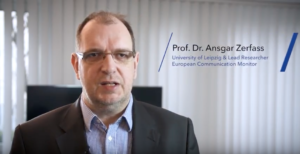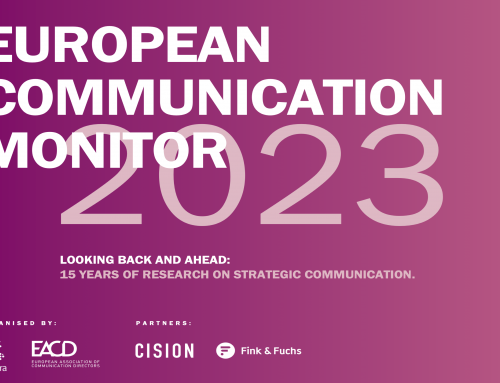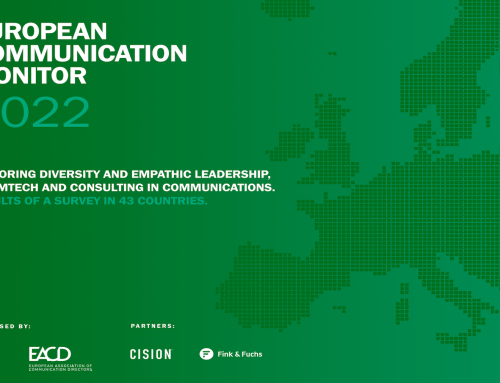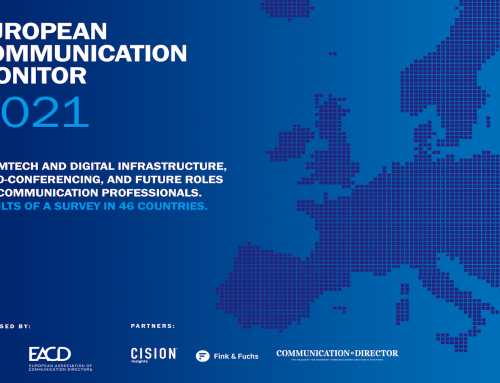 The 10th anniversary of the European Communication Monitor was celebrated today on July 7 in Brussels with the launch of the report at the European Communications Summit 2016. The event itself provided an excellent opportunity to reflect on the key trends of corporate communications. A key panel featuring Prof. Christof Ehrhart, Executive Vice President Corporate
The 10th anniversary of the European Communication Monitor was celebrated today on July 7 in Brussels with the launch of the report at the European Communications Summit 2016. The event itself provided an excellent opportunity to reflect on the key trends of corporate communications. A key panel featuring Prof. Christof Ehrhart, Executive Vice President Corporate  Communications and Responsibility Deutsche Post DHL Group, highlighted and reflected findings of the ECM 2016. Ehrhart delivered a presentation about big and small data in communications and mapped the future of the field. Professor Dejan Vercic from the research team showed that results of the study demonstrate the urgency of communications to tackle important topics like big data and automation.
Communications and Responsibility Deutsche Post DHL Group, highlighted and reflected findings of the ECM 2016. Ehrhart delivered a presentation about big and small data in communications and mapped the future of the field. Professor Dejan Vercic from the research team showed that results of the study demonstrate the urgency of communications to tackle important topics like big data and automation.
Main topics covered
Besite the usage of big data and algorithms for strategic communication, the European Communication Monitor 2016 discusses new ways to enable top management and other staff. Other topics include stakeholder engagement, the role of social media influencer as well as social media skills and management competencies.
Based on responses from 2,710 senior professionals from 43 countries, the monitor reveals that more than 70 per cent of European communication professionals believe that big data will change their profession but only a minority has a comprehensive understanding of the topic. Three out of four respondents agree that communication activities should be aligned with the external algorithms of search engines or social media platforms. Yet only 21 per cent state that their communication departments or agencies have implemented such routines. Even fewer use the power of algorithms proactively for automatically adapting or creating content.
 Professor Ansgar Zerfass from the University of Leipzig and lead researcher of the survey, explained:
Professor Ansgar Zerfass from the University of Leipzig and lead researcher of the survey, explained:
“For the first time ever, it is possible to track and prove the changing relevance of strategic issues and communication channels over a decade. Longitudinal data from more than 21,000 respondents across Europe based on sound academic standards reveal a rise and decline of digital and social responsibility, as well as the unsolved challenge of linking business strategy and communication.”
Big data and automation
More than 70 per cent of European communication professionals believe that big data will change their profession but only a minority has a comprehensive understanding of the topic. Three out of four respondents agree that communication activities should be aligned with the external algorithms of search engines or social media platforms. Yet only 21 per cent state that their communication departments or agencies have implemented such routines. Even fewer use the power of algorithms proactively for automatically adapting or creating content.
Social media influencers (SMIs)
Third party endorsers shaping stakeholder attitudes through blogs, tweets and posts are important for a majority of organisations across Europe (58.4%). But only 42.9% use specific strategies to communicate with such social media influencers and even less (40.1%) have specific approaches to identify them.
Stakeholder engagement
Engagement is a much-debated but often misunderstood concept in today’s societies and organisations. The study reveals that communication professionals conceptualise engagement mostly as a communication activity. Emotional drivers and institutionalised interactions might be overlooked.
Communication practices
 Communicators employ a variety of tasks. In a typical week, they spend 36.2% of their productive time at work for operational communication, 27.8% for managing, 18.8% for reflective activities (alignment with internal goals and stakeholders) and 17.2% for coaching, training and enabling members of their organisation. They employ different approaches when supporting either senior managers or other staff.
Communicators employ a variety of tasks. In a typical week, they spend 36.2% of their productive time at work for operational communication, 27.8% for managing, 18.8% for reflective activities (alignment with internal goals and stakeholders) and 17.2% for coaching, training and enabling members of their organisation. They employ different approaches when supporting either senior managers or other staff.
Strategic issues
Longitudinal data collected over a decade (2007-2016) indicate that digitisation, mediatisation and new demands from business and society have changed communication management dramatically. Responses from more than 21,000 practitioners across Europe show that the strategic alignment of communication and organisational goals is the most stable issue, mentioned as a challenge by more than 42% in every single year. Digitalisation and building trust are additional topics that keep many leaders awake at night.
Communication channels and instruments
 Face-to-face communication is the most relevant instrument today, taking the top position for the first time in 10 years of data. Social media was rated important by a minority between 2007 and 2011, today 76.2% favour such instruments, and 88.9% believe they will be important for addressing stakeholders in 2019. On the contrary, traditional media relations with print media is on the decline. 64.1% believe in its importance today, but this figure drops to 30.2% in 2019.
Face-to-face communication is the most relevant instrument today, taking the top position for the first time in 10 years of data. Social media was rated important by a minority between 2007 and 2011, today 76.2% favour such instruments, and 88.9% believe they will be important for addressing stakeholders in 2019. On the contrary, traditional media relations with print media is on the decline. 64.1% believe in its importance today, but this figure drops to 30.2% in 2019.
Knowledge and competency development
Staff competencies are a key driver of organisational success. However, the level of social media competencies of communicators is rather mediocre. Only 65.2% report high capabilities for delivering messages via social media. A similar picture emerges in the field of management competencies. There is a clear gap between training offered by employers and the development needs of practitioners – technical skills and knowledge are underrated.
Characteristics of excellent communication departments
 Excellent departments are forerunners in big data, deal more intensively with social media influencers, and invest significantly more in personnel development. They employ practitioners with stronger management and social media skills, who spend less time on operational work, put more effort into strategic tasks and focus on supporting top management.
Excellent departments are forerunners in big data, deal more intensively with social media influencers, and invest significantly more in personnel development. They employ practitioners with stronger management and social media skills, who spend less time on operational work, put more effort into strategic tasks and focus on supporting top management.
Report, video and further material available
The PDF report with full results as well as a video featuring highlights from the study as well as more material like 10 Starting Points for Discussion or articles published in the Communication Director Magazine are available here.








